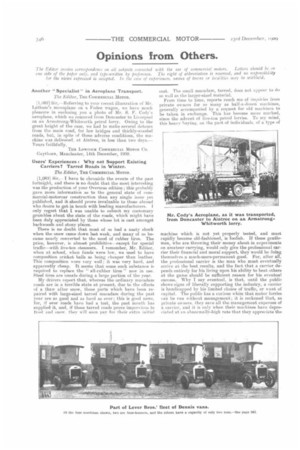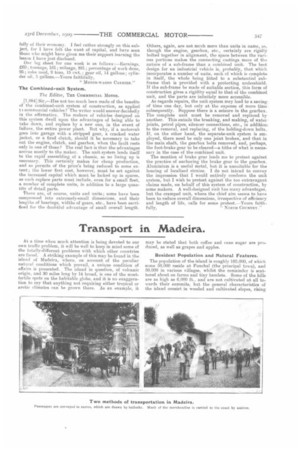Opinions from Others.
Page 14

Page 15

If you've noticed an error in this article please click here to report it so we can fix it.
The Editor invites correspondence on all snbiects connected with Ike use of commercial motors. Letters should be OR 07IC side of the paper only. and type-written by Preference. The right of abbreviatwn is reserved, and no responsibility fur the views expressed is accepted. In the case of experiences, urunes of towns or beauties may be withheld.
Another " Specialist " in Aeroplane Transport.
The Editor, Tan COMMERCIAL MOTOR.
[1,082] Sir,—Iteferring to your recent illustration of Mr. Latham's monoplane on a rodeo wagon, we have much pleasure in enclosing you a photo of Mr. S. F. Cody 'ii aeroplane, which we removed from Doncaster to Liverpool on an Armstrong-Whitworth petrol lorry. Owing to the great height of the case, we had to make several detours from the main road, for low bridges and thickly-wooded roads, but, in spite of these adverse conditions, the machine was delivered, at Aintree, in loss than two days.-Yours Faithfully, THE LOWCOCK COMMERCIAL MOTOR CO, CaythOrn, Manchester, 14th December, 1909.
Users' Experiences : Why not Support Existing Carriers? Tarred Roads in Winter.
The Editor, THE COMMERCIAL IVIOTOR.
1,083] Sir,I have to chronicle the events of the past fortnight., and there is no doubt that the most interesting was the pmduction of your Overseas edition; this probably gave snore information as to the general state of commercial-motorcar construction than any single issue yet. published, and it should prove invaluable to those abroad who desire to get in touch with leading manufacturers. I only regret that I tirEt.S unable to submit my customary grumbles about the state of the roads, which might have been duly appreciated by those whose lot is east amongst backwoods and stony places.
There is no doubt that most of us had a nasty shock when the snow came down last week, and many of us became nearly converted to the need of rubber tires. The price, however, is almost prohibitive—except for special traffie--witht five-ton steamers. I remember, Mr. Editor, when at school, when funds were low, we used to have composition cricket balls as being cheaper than leather. This composition wore very well; it was very hard, and apparently cheap. It seems that some such substance is required to replace the " all-rubber tires " now in use. Steel tires are unsafe during a large portion of the year.
My drivers report that, whereas the ordinary macadam roads are in a terrible state at present, due to the effects of a thaw after snow, those parts which have been repaired with large-sized tarred macadam during the past year are as good and as hard Its ever ; this is good news, for, if ever roads have had a test, the past month has supplied it, and, if these tarred roads prove impervious to frost 'and snow. they will soon pay for their extra initial cost. The small macadam, tarred, does not appear Lo do so well as the larger-sized material. From time to time, reports reach me of inquiries from private owners for as many as half-a-dozen machines, generally accompanied by a request for old machines to be taken in exchange. This has become more marked, since the advent of five-ton petrol lorries. To my mind, this heavy hnying. on the part of individuals, of a type of
machine which is not yet properly tested, and must rapidly become old-fashioned, is foolish_ If these gentlemen, who are throwing their money about in esperiments on amateur carrying, would only give the professional carrier their financial and moral support, they would be doing themselves a moil-more-permanent good. For, after all, the professional carrier is the man who must eventually arrive at the best results, arid the fact that a carrier depends entirely for his living upon his ability to heat others at the game should be sufficient reason for his eventual success. Why I say eventual, is that, until the public shows signs of liberally supporting the industry, a carrier is handicapped by his limited choice of traffic, or want of capital. The public has a curious whim that motor lorries can be run without management; it is reckoned that, as private owners, they save all the management expenses of a carrier, and it is only when their machines have depreciated at en abnormally-high rate that they appreciate the folly of their economy. I feel rather strongly on this subject, for 1 have felt the want of capital, and have seen those who might have given me their support learning the lesson 1 have just disclosed.
Our log sheet for one week is as follows :—Earnings, 69 ; tonnage, 161; mileage, 881; percentage of work done, 95; coke used, 9 tons, 15 cwt. ; gear oil, 14 gallons ; cylinder oil, 5 gallons.—Yours faithfully, " Moroa-wAooN CARRIER."
The Combined-unit System.
The Editor, THE COMMERCIAL MOTOR.
[1,084] Sir,—Has not too much been made of the benefits of the combined-unit system of construction, as applied to commercial vehicles? The writer would answer decidedly in the affirmative. The makers of vehicles designed on this system dwell upon the advantages of being able to take down, and replace by a new one, in the event of failure, the entire power plant. But why, if a motorcab goes into garage with a stripped gear, a cracked water jacket, or a fired clutch, should it be necessary to take out the engine, clutch, and gearbox, when the fault rests only in one of these P The real fact is that the advantages accrue mostly to the maker. The unit system lends itself to the rapid assembling of a chassis, as no lining up is necessary. This certainly makes for cheap production, and so permits of the price's being reduced to some extent ; the lower first cast, however, must be set against the increased capital which must be locked up in spares, as such replace parts must include, even for a small fleet, a number of complete units, in addition to a large quantity of detail parts.
There are, of course, units and units; some have been compressed into extremely-small dimensions, and their lengths of bearings, widths of gears, etc., have been sacrificed for the doubtful advantage of small overall length. Others, again, are not much more than units in name, as, though the engine, gearbox, etc., certainly are rigidly bolted together in alignment, the space between the various portions makes the connecting castings more of the nature of a sub-frame than a combined unit. The best design for an industrial vehicle is, probably, that which incorporates a number of units, each of which is complete in itself, the whole being fitted to a substantial subframe that is provided with a protecting undershield. If the sub-frame be made of suitable section, this form of construction gives a rigidity equal to that of the combined unit, and the parts are infinitely more accessible.
As regards repairs, the unit system may lead to a saving of time one day, but only at the expense of more time • subsequently. Suppose there is a seizure in the gearbox. The complete unit must be removed and replaced by another. This entails the breaking, and making, of water • joints, petrol pipes, silencer connections, etc., in additions to the removal, and replacing, of the holding-down bolts.. 1f, on the other hand, the separate-unit system is employed, there need be only one joint broken, and that in the main shaft, the gearbox bolts removed, and, perhaps, the foot-brake gear to be cleared—a tithe of what is necessary in the case of the combined unit. The mention of brake gear leads me to protest against the practice of anchoring the brake gear to the gearbox. Aluminium is a useful metal, but it is unsuitable for the bearing of localized strains. I do not intend to convey the impression that I would entirely condemn the unit system, but I wish to protest against the too extravagant claims made, on behalf of this system of construction, by some makers. A well-designed unit has many advantages, but the cramped unit, where the chief aim seems to have been to reduce overall dimensions, irrespective of efficiency and length of life, calls for some pi-asst.—Yours faith..
fully, " NORTH COUNTRY."




















